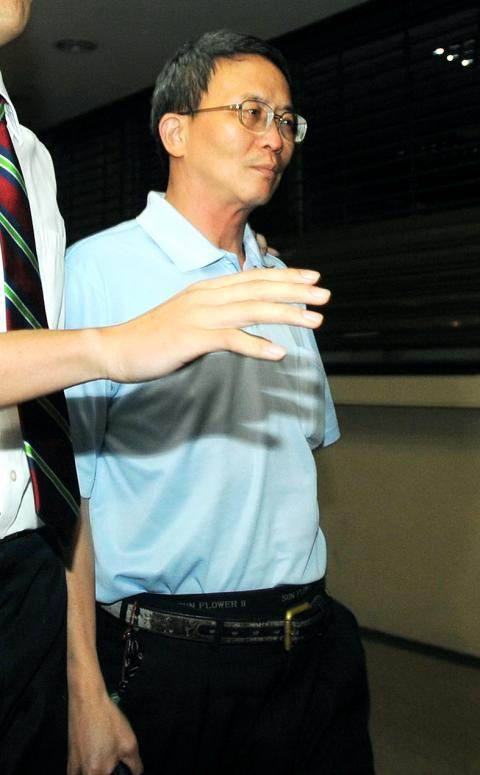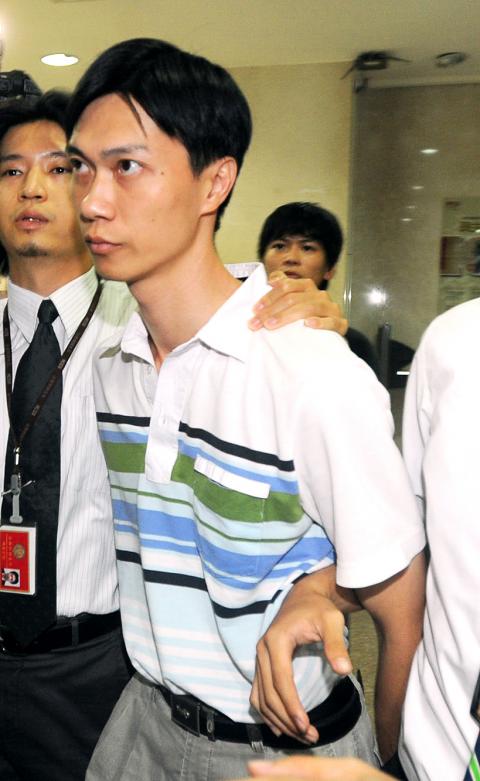|
Academic’s detention
sparks debate
ONE MAN’S TERRORIST: Prosecutors allege Wu
Chang-yu collected and gave to China information on those it deems ‘terrorists,’
such as Chinese dissidents and Tibetan activists
By Su Yung-yao and Rich Chang / Staff Reporters

Prosecutors allege Wu Chang-yu
collected information on Chinese dissidents, pro-Tibetan independence activists
and the Falun Gong movement in Taiwan, and delivered that information to Chinese
authorities.
Photo: Taipei Times

The National Police Bureau’s
officier Wu Tung-lin is released on NT$100,000 bail after interrogation
yesterday.
Photo: Taipei Times
The detention of a Central Police
University professor yesterday on suspicion of having gathered intelligence for
China has sparked much debate, with sources saying that since the signing of a
cross-strait agreement on joint efforts to combat crime, China has repeatedly
asked Taiwan to establish “anti-terrorism” cooperation targeting pro-Taiwanese
independence groups, pro-Xinjiang independence groups, pro-Tibetan independence
groups, Falun Gong practitioners and social activists.
Taiwan has so far declined to agree to cooperate because the people China lists
as “terrorists” are mostly political dissidents, sources said.
Wu Chang-yu (吳彰裕), an associate professor with the Central Police University’s
Department of Administrative Management, teaches Chinese political history at
the university.
The court granted prosecutors’ request to detain him after interrogation.
Taipei prosecutors also applied to detain Lin Po-hung (林柏宏), a police officer
with the -National Police Bureau’s (NPB) Foreign Affairs Department, but the
district court released Lin without bail. Prosecutors released another NPB
officer, Wu Tung-lin (吳東霖), on NT$100,000 bail.
Prosecutors allege Wu Chang-yu collected information on Chinese dissidents,
pro-Tibetan independence activists and the Falun Gong movement in Taiwan, and
delivered that information to Chinese authorities.
Prosecutors said Wu Chang-yu told investigators the information he offered was
not confidential, but common information.
Wu Chang-yu also denied he received money from China, but prosecutors said they
have evidence Wu Chang-yu had received at least several free flights to Chinese
cities from Chinese authorities.
Wu Chang-yu’s colleagues at the university declined to comment after his arrest,
but some have privately said that Wu was troublesome.
Wu Chang-yu receives broad media coverage as a fortune-teller, and the school’s
Administrative Management Department has asked him to refrain from mentioning
that he teaches at the school while appearing in the media, sources said.
As to whether Wu was helping Beijing gather intelligence, an academic that
frequently -travels to China said that China’s intelligence gathering on Taiwan
was very thorough, with complete records of who has a special background or is
connected to political figures and parties in Taiwanese academia.
This has been made easier for China since President Ma Ying-jeou (馬英九) came to
power because cross-strait exchanges have become more frequent, the academic
said, adding that the information given to Beijing was both more up-to-date and
more accurate.
According to sources, a law professor from National Chengchi University (NCCU)
had gone to China on an academic -exchange this summer, but had been questioned
by the Ministry of State Security (MSS) without cause and forcibly detained for
two to three days.
Academics who are aware of such proceedings said it was not the first time that
had happened, and there have been incidents of Taiwanese academics being
harassed by the MSS before.
However, the academic added that it was harder to understand why it was still
happening, because since Ma came into power, he has claimed that cross-strait
relations have improved greatly.
Additional reporting by AFP
Translated by Jake Chung, Staff Writer
|
![]()
![]()